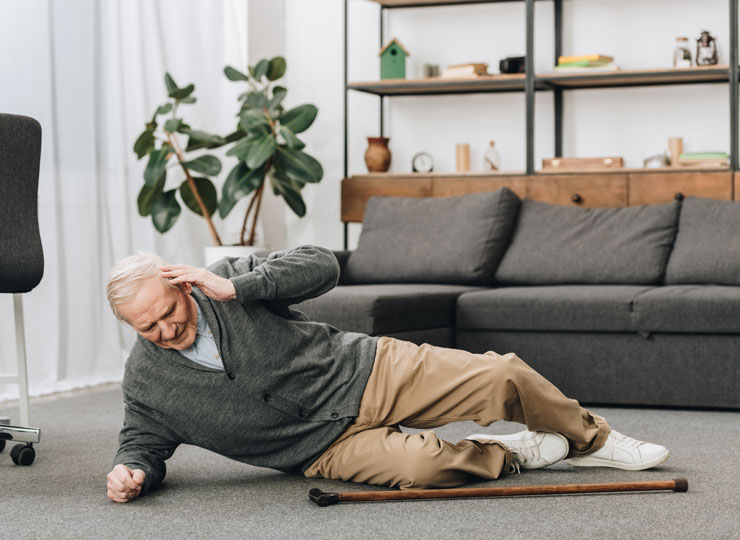
August 10, 2022
New research sheds light on one of the most common problems in older people: falls, which are of particular concern for someone with Alzheimer’s disease. Learning more about what causes falls, and why it’s so important to avoid them, can go a long way in helping anyone who is caring for a loved one with dementia.
Falls typically lead to hip fractures, which are a leading cause of disability in the elderly. For the study, presented at the 2022 Congress of the European Academy of Neurology, researchers analyzed the medical records of 122,614 older men and women in Sweden who had suffered a hip fracture between 2010 and 2018.
The researchers found that people with Alzheimer’s disease are six times more likely to have a serious fall than those of a similar age who do not have dementia, and are far more likely to die as a result. People with Alzheimer’s who fall and break a hip also typically require many additional months of recuperation following hip surgery to repair the fracture before they can walk again.
The researchers say that the findings underscore the importance of discussing with patients and caregivers how certain medications can dramatically increase the risk of falls in the elderly. Chief among these are so-called psychotropic medications, which include antidepressants, antipsychotic drugs and benzodiazepines. Many experts say these drugs are too often liberally prescribed to people with Alzheimer’s disease to ease behavioral issues like agitation, depression and wandering.
Examples of psychotropic medications include antipsychotics like risperidone, quetiapine and haloperidol; benzodiazepines like diazepam, oxazepam and lorazepam; and antidepressants like sertraline (Zoloft), escitalopram (Lexapro) and fluoxetine (Prozac).
Many drugs besides psychotropic medications can contribute to falls, including blood pressure drugs, anticonvulsants and opioids. Problems with vision, perception and balance also increase as Alzheimer’s advances, making the risk of a fall more likely.
It’s therefore important that persons with Alzheimer’s and those who care for them take measures to prevent falls. Extra attention must also be given to those with Alzheimer’s who are undergoing rehabilitation following a fall and fracture. Fall prevention is important for caregivers as well, since those who care for a loved one with Alzheimer’s must remain mobile and healthy in order to provide optimal care.
The National Center for Injury Prevention and Control, part of the federal Centers for Disease Control and Prevention, recommends a number of measures to reduce the chance of falls. Since about half of all falls occur in the home, the center recommends a number of steps to make the home safer.
- Remove things you can trip over, such as papers, books, clothes, and shoes, from stairs and places where you walk.
- Remove small throw rugs or use double-sided tape to keep the rugs from slipping [and to keep corners and sides flat].
- Keep often-used items in cabinets you can easily reach without a step stool.
- Install grab bars next to your toilet and in the tub or shower.
- Use non-slip mats in the bathtub and on shower floors.
- Improve the lighting in your home. As you get older, you need brighter lights to see well. Lamp shades or frosted bulbs can reduce glare.
- Install handrails and lights on all staircases.
- Wear shoes that give good support and have thin non-slip soles. Avoid wearing slippers and athletic shoes with deep treads.
- Be extremely careful outdoors when weather is rainy or icy, or when walking on dead leaves or uneven surfaces.
People with Alzheimer’s are particularly likely to have vision or perception problems. Busy patterns, for example, may make it difficult for the person with Alzheimer’s to navigate about a room. Or similar-colored furniture, tables and carpets may be hard to distinguish for the person with Alzheimer’s.
Other steps to reduce the likelihood of falls include getting regular exercise, which can help to improve balance, strength and agility. The ancient martial art of tai chi, for example, has been shown to improve balance and reduce the risk of falls. Ask your doctor about the best type of exercise for you or for someone with Alzheimer’s. Keep in mind, some people with dementia may have difficulty learning a new kind of exercise, and that with the elderly, exercise can also be a source of falls and accidents.
Finally, regular vision check-ups are important for people of all ages, particularly seniors. Eye problems like cataracts, for example, make it difficult to see and can increase the chance of falls, but are easily corrected.
By ALZinfo.org, The Alzheimer’s Information Site. Reviewed by Marc Flajolet, Ph.D., Fisher Center for Alzheimer’s Research Foundation at The Rockefeller University.
Source: D. Religa, S. Hägg, F. Gustavsson, et al: “Clinical outcome of patients with hip fracture and dementia.” Congress of the European Academy of Neurology (EAN) 2022. Abstract A-22-04968. Presented June 27, 2022.











